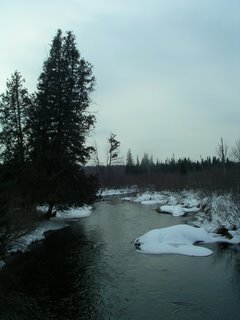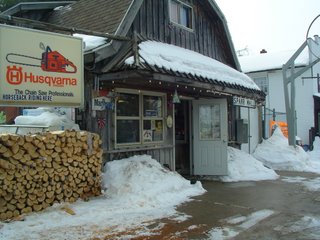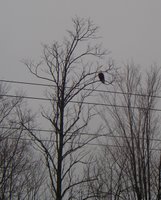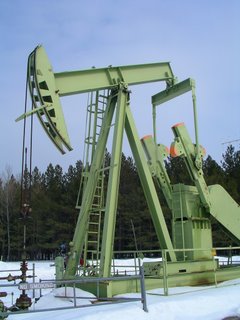 If you were to ask any of the five million souls living in the dank shadows of factory smokestacks and freeway overpasses of metro Detroit where to find the nearest wilderness area, the most common response would be a quizical look with a "dunno" or "couldn't tell you." Only a handful of people would mention Pigeon River Country, located four hours north of Detroit near the hamlet of Gaylord, Michigan.
If you were to ask any of the five million souls living in the dank shadows of factory smokestacks and freeway overpasses of metro Detroit where to find the nearest wilderness area, the most common response would be a quizical look with a "dunno" or "couldn't tell you." Only a handful of people would mention Pigeon River Country, located four hours north of Detroit near the hamlet of Gaylord, Michigan.
Before we go any further, we need to define our idea of wilderness, since the concept is fluid and subjective. Compared to Alaska, is this wilderness? No. Compared to Idaho, is this wilderness? No. Compared to anywhere within a 300 mile radius around Detroit, is this wilderness? When we filter that question through the broad mix of paradigms and perceptions and ideals (real and imagined) necessary to formulate such an answer, the conclusion is absolutely. Or so we used to think. Pigeon River Country is a mix of state and privately owned lands totalling over 100,000 acres. By western standards, where the Frank Church Wilderness in Idaho is 2.3 million acres and the Yukon Delta Wilderness in Alaska is over 14 million acres, Pigeon River Country is a pimple on the nipple of Mother Nature. That said, Pigeon River has unique features of its own: High ridges encircle deep and forboding cedar bogs. The birch and spruce trees of northern latitudes mix amiably with southern gents like pin oaks and red maples and shade rivers known for blue ribbon brown and brook trout fishing. Thick woodlands provide habitat for a resident herd of over one thousand elk, the largest west of the Rocky Mountains. And perhaps best of all, not a single "Jellystone Park" or "Dollywood" or comparable schmaltzy tourist trap which sit at the front gates of Yellowstone and Great Smoky Mountains. In Pigeon River Country, the narrow dirt roads keep the motorhomes away, and the "unimproved" campgrounds (where the pit toilets smell bad and flies buzz your backside as you sit there), keep out all but the most dedicated of visitors.
Pigeon River Country is a mix of state and privately owned lands totalling over 100,000 acres. By western standards, where the Frank Church Wilderness in Idaho is 2.3 million acres and the Yukon Delta Wilderness in Alaska is over 14 million acres, Pigeon River Country is a pimple on the nipple of Mother Nature. That said, Pigeon River has unique features of its own: High ridges encircle deep and forboding cedar bogs. The birch and spruce trees of northern latitudes mix amiably with southern gents like pin oaks and red maples and shade rivers known for blue ribbon brown and brook trout fishing. Thick woodlands provide habitat for a resident herd of over one thousand elk, the largest west of the Rocky Mountains. And perhaps best of all, not a single "Jellystone Park" or "Dollywood" or comparable schmaltzy tourist trap which sit at the front gates of Yellowstone and Great Smoky Mountains. In Pigeon River Country, the narrow dirt roads keep the motorhomes away, and the "unimproved" campgrounds (where the pit toilets smell bad and flies buzz your backside as you sit there), keep out all but the most dedicated of visitors. Two sister rivers, the Pigeon and the Black, share simple spring-fed origins before flowing north, nimble and pure. Beaver dams, log jams, and a shallow river bottom keep the canoe liveries and the noisy beer-guzzling frat boys from defiling their virginal spirits. Aside from a handful of hikers and hard-core fly fishermen, few people venture into Pigeon River Country. One of the most noted was a young Ernest Hemingway, who would sneak away from his parents' summer cottage on nearby Walloon Lake to go fishing on the Black River (pictured here). He later wrote of these trips in his Nick Adams short stories, and his literary description of the area was "as wild as the devil." (Hence the title of this post. Ernest would be most proud). Another famous visitor a few years back was consumate fly-fisherman and former president Jimmy Carter (back to Hemingway: years ago, we asked an old timer at the gas station in Seney, Michigan if he remembered Hemingway fishing the nearby Fox River. The old codger snickered and said EH got red-eye drunk, slept under the railroad bridge, and never wet a fishing line. So much for literary purity. He was still a hell of a writer so we'll cease further comment for a moment).
Two sister rivers, the Pigeon and the Black, share simple spring-fed origins before flowing north, nimble and pure. Beaver dams, log jams, and a shallow river bottom keep the canoe liveries and the noisy beer-guzzling frat boys from defiling their virginal spirits. Aside from a handful of hikers and hard-core fly fishermen, few people venture into Pigeon River Country. One of the most noted was a young Ernest Hemingway, who would sneak away from his parents' summer cottage on nearby Walloon Lake to go fishing on the Black River (pictured here). He later wrote of these trips in his Nick Adams short stories, and his literary description of the area was "as wild as the devil." (Hence the title of this post. Ernest would be most proud). Another famous visitor a few years back was consumate fly-fisherman and former president Jimmy Carter (back to Hemingway: years ago, we asked an old timer at the gas station in Seney, Michigan if he remembered Hemingway fishing the nearby Fox River. The old codger snickered and said EH got red-eye drunk, slept under the railroad bridge, and never wet a fishing line. So much for literary purity. He was still a hell of a writer so we'll cease further comment for a moment). If you run out of batteries or firewood while visiting Pigeon River, one mercantile you can go to for supplies and groceries is the Sparr Mall. We have to admit: we sometimes find ourselves yearning for the simply life where you live on the fringes of civilization. Where you buy milk at the same place you get chainsaw oil. Where the only radio station that comes in clear is country/western. But then we look back upon the ten years we spent living this way, and how the realities of isolation ultimately shattered the illusion that living apart from society would somehow enlighten us.
If you run out of batteries or firewood while visiting Pigeon River, one mercantile you can go to for supplies and groceries is the Sparr Mall. We have to admit: we sometimes find ourselves yearning for the simply life where you live on the fringes of civilization. Where you buy milk at the same place you get chainsaw oil. Where the only radio station that comes in clear is country/western. But then we look back upon the ten years we spent living this way, and how the realities of isolation ultimately shattered the illusion that living apart from society would somehow enlighten us. We've had a similiar awakening about our idealistic notions of the integrity of literature and the sanctity of wilderness as well. Hemingway, for all his literary skill, was in many ways a fraud to himself and the people closest to him. This bald eagle, our rugged symbol of American resilence and strength, sits perched above a powerline that would kill him in a nanosecond if he were to land on a transformer. Hemingway and the bald eagle once shared the same iconic status in our misguided belief that universal absolutes existed in the books we read and the places we hiked.
We've had a similiar awakening about our idealistic notions of the integrity of literature and the sanctity of wilderness as well. Hemingway, for all his literary skill, was in many ways a fraud to himself and the people closest to him. This bald eagle, our rugged symbol of American resilence and strength, sits perched above a powerline that would kill him in a nanosecond if he were to land on a transformer. Hemingway and the bald eagle once shared the same iconic status in our misguided belief that universal absolutes existed in the books we read and the places we hiked. Just a wing-stroke down the road, the powerline ends at one of the 15,000 oil wells that tap into the Antrim Band, the large undergound vein of oil and natural gas spanning between Petoskey and Alpena. Several hundred wells pump away inside the boundaries of Pigeon River Country. Watching bull elk gather around the clanking machines to lick the ground, made salty from the briny water sucked up from a mile below, we re-examine our paradigms about places once believed to be pristine and wild. Our definition of wilderness, just like our definition of literary purity, is a subjective concept indeed.
Just a wing-stroke down the road, the powerline ends at one of the 15,000 oil wells that tap into the Antrim Band, the large undergound vein of oil and natural gas spanning between Petoskey and Alpena. Several hundred wells pump away inside the boundaries of Pigeon River Country. Watching bull elk gather around the clanking machines to lick the ground, made salty from the briny water sucked up from a mile below, we re-examine our paradigms about places once believed to be pristine and wild. Our definition of wilderness, just like our definition of literary purity, is a subjective concept indeed.
skip to main |
skip to sidebar
Pithy Banter and Less Than Inspired Photography

